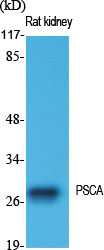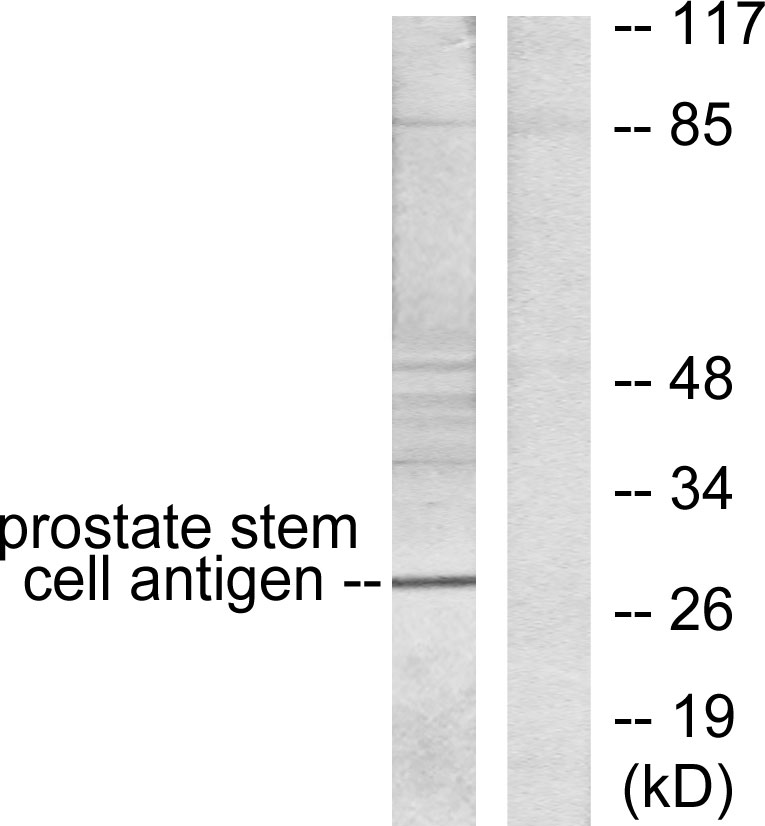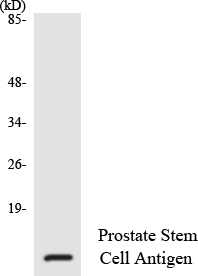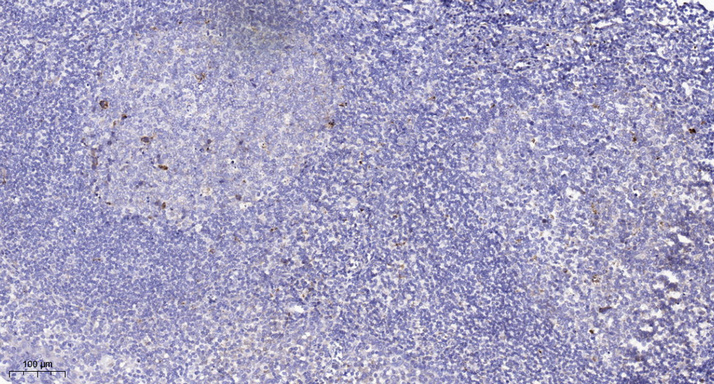PSCA Polyclonal Antibody
- Catalog No.:YT3877
- Applications:WB;ELISA;IHC
- Reactivity:Human;Mouse
- Target:
- PSCA
- Gene Name:
- PSCA
- Protein Name:
- Prostate stem cell antigen
- Human Gene Id:
- 8000
- Human Swiss Prot No:
- O43653
- Mouse Swiss Prot No:
- P57096
- Immunogen:
- The antiserum was produced against synthesized peptide derived from human Prostate Stem Cell Antigen. AA range:41-90
- Specificity:
- PSCA Polyclonal Antibody detects endogenous levels of PSCA protein.
- Formulation:
- Liquid in PBS containing 50% glycerol, 0.5% BSA and 0.02% sodium azide.
- Source:
- Polyclonal, Rabbit,IgG
- Dilution:
- WB 1:500-2000;IHC 1:50-300; ELISA 2000-20000
- Purification:
- The antibody was affinity-purified from rabbit antiserum by affinity-chromatography using epitope-specific immunogen.
- Concentration:
- 1 mg/ml
- Storage Stability:
- -15°C to -25°C/1 year(Do not lower than -25°C)
- Other Name:
- PSCA;Prostate stem cell antigen
- Observed Band(KD):
- 29kD
- Background:
- This gene encodes a glycosylphosphatidylinositol-anchored cell membrane glycoprotein. In addition to being highly expressed in the prostate it is also expressed in the bladder, placenta, colon, kidney, and stomach. This gene is up-regulated in a large proportion of prostate cancers and is also detected in cancers of the bladder and pancreas. This gene includes a polymorphism that results in an upstream start codon in some individuals; this polymorphism is thought to be associated with a risk for certain gastric and bladder cancers. Alternative splicing results in multiple transcript variants. [provided by RefSeq, Feb 2010],
- Function:
- function:May be involved in the regulation of cell proliferation. Has a cell-proliferation inhibition activity in vitro.,induction:Down-regulated in gastric cancer cells.,polymorphism:Genetic variations in PSCA may influence susceptibility to diffuse-type gastric cancer.,similarity:Contains 1 UPAR/Ly6 domain.,tissue specificity:Highly expressed in prostate (basal, secretory and neuroendocrine epithelium cells). Also found in bladder (transitional epithelium), placenta (trophoblasts), stomach (neuroendocrine cells), colon (neuroendocrine cells) and kidney (collecting ducts). Overexpressed in prostate cancers and expression is correlated with tumor stage, grade and androgen-independence. Highly expressed in prostate cancer bone metastases. Expressed in gastric epithelial cells, mainly in the isthmus (at protein level). Not detected in normal intestinal epithelium (at protein level).,
- Subcellular Location:
- Cell membrane ; Lipid-anchor, GPI-anchor .
- Expression:
- Highly expressed in prostate (basal, secretory and neuroendocrine epithelium cells). Also found in bladder (transitional epithelium), placenta (trophoblasts), stomach (neuroendocrine cells), colon (neuroendocrine cells) and kidney (collecting ducts). Overexpressed in prostate cancers and expression is correlated with tumor stage, grade and androgen-independence. Highly expressed in prostate cancer bone metastases. Expressed in gastric epithelial cells, mainly in the isthmus (at protein level). Not detected in normal intestinal epithelium (at protein level). Expressed in brain cortex; expression is significantly increased in the front cortex of Alzheimer disease patients.
- June 19-2018
- WESTERN IMMUNOBLOTTING PROTOCOL
- June 19-2018
- IMMUNOHISTOCHEMISTRY-PARAFFIN PROTOCOL
- June 19-2018
- IMMUNOFLUORESCENCE PROTOCOL
- September 08-2020
- FLOW-CYTOMEYRT-PROTOCOL
- May 20-2022
- Cell-Based ELISA│解您多样本WB检测之困扰
- July 13-2018
- CELL-BASED-ELISA-PROTOCOL-FOR-ACETYL-PROTEIN
- July 13-2018
- CELL-BASED-ELISA-PROTOCOL-FOR-PHOSPHO-PROTEIN
- July 13-2018
- Antibody-FAQs
- Products Images

- Western Blot analysis of various cells using PSCA Polyclonal Antibody diluted at 1:1000
.jpg)
- Western Blot analysis of HepG2 cells using PSCA Polyclonal Antibody diluted at 1:1000

- Western blot analysis of lysates from HepG2 cells, using Prostate Stem Cell Antigen Antibody. The lane on the right is blocked with the synthesized peptide.

- Western blot analysis of the lysates from HeLa cells using Prostate Stem Cell Antigen antibody.

- Immunohistochemical analysis of paraffin-embedded human tonsil. 1, Antibody was diluted at 1:200(4° overnight). 2, Tris-EDTA,pH9.0 was used for antigen retrieval. 3,Secondary antibody was diluted at 1:200(room temperature, 45min).


